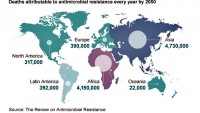Great Recession Might Have Triggered 500,000 Additional Cancer Deaths
| Arthur Dominic Villasanta | | May 26, 2016 06:21 AM EDT |
Cancer cells dividing
Being broke kills and the Great Recession from 2008 to 2010 is being blamed for 500,000 additional cancer deaths among persons that couldn't afford life-saving treatment either because they were unemployed or there were healthcare cuts in their countries.
A study published in medical journal The Lancet analyzed the link between unemployment, public healthcare spending and cancer mortality. Researchers used World Health Organization and World Bank statistics on over 70 countries with two billion inhabitants to analyze cancer death trends from 1990 to 2010.
Like Us on Facebook
They found that every one percent increase in unemployment was associated with 0.37 additional cancer deaths per 100,000 people. The term "additional deaths" describe people that would not otherwise have died.
This data was derived from an observed rise in cancer deaths for every percentage increase in unemployment, and every drop in public healthcare spending.
"This suggests that there could have been well over 500,000 excess cancer deaths worldwide during this time," said study author Mahiben Maruthappu of Imperial College London
"From our analysis we estimate that the economic crisis was associated with over 260,000 excess cancer deaths in the OECD alone between 2008 to 2010."
OECD stands for the Organization for Economic Cooperation and Development, an international economic organization of 34 countries founded in 1961 to stimulate economic progress and world trade.
The study estimated 160,000 additional deaths in the European Union. The estimate additional death in the U.S was 18,000 and 1,500 for France. Spain and Britain, which provide universal healthcare, recorded no additional deaths.
Maruthappu noted that cancer is a leading cause of death worldwide so understanding how economic changes affect cancer survival is critical.
"We found that increased unemployment was associated with an increased cancer mortality, but that universal health coverage protected against these effects," said Maruthappu.
"This was especially the case for treatable cancers including breast, prostate and colorectal cancer."
The study also builds a case in favor of universal health coverage and its protective effect on cancer mortality. It discovered that every one percent drop in healthcare spending was associated with 0.0053 additional deaths per 100,000 people.
TagsGreat Recession, Cancer, cancer deaths, Mahiben Maruthappu
©2015 Chinatopix All rights reserved. Do not reproduce without permission
EDITOR'S PICKS
-

Did the Trump administration just announce plans for a trade war with ‘hostile’ China and Russia?
-

US Senate passes Taiwan travel bill slammed by China
-

As Yan Sihong’s family grieves, here are other Chinese students who went missing abroad. Some have never been found
-

Beijing blasts Western critics who ‘smear China’ with the term sharp power
-

China Envoy Seeks to Defuse Tensions With U.S. as a Trade War Brews
-

Singapore's Deputy PM Provides Bitcoin Vote of Confidence Amid China's Blanket Bans
-

China warns investors over risks in overseas virtual currency trading
-

Chinese government most trustworthy: survey
-

Kashima Antlers On Course For Back-To-Back Titles
MOST POPULAR
LATEST NEWS
Zhou Yongkang: China's Former Security Chief Sentenced to Life in Prison

China's former Chief of the Ministry of Public Security, Zhou Yongkang, has been given a life sentence after he was found guilty of abusing his office, bribery and deliberately ... Full Article
TRENDING STORY

China Pork Prices Expected to Stabilize As The Supplies Recover

Elephone P9000 Smartphone is now on Sale on Amazon India

There's a Big Chance Cliffhangers Won't Still Be Resolved When Grey's Anatomy Season 13 Returns

Supreme Court Ruled on Samsung vs Apple Dispute for Patent Infringement

Microsoft Surface Pro 5 Rumors and Release Date: What is the Latest?













